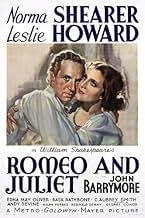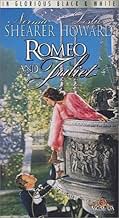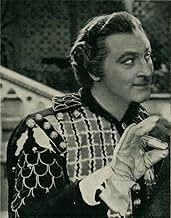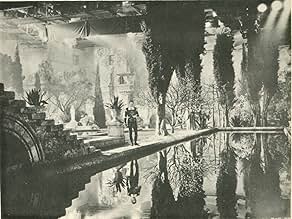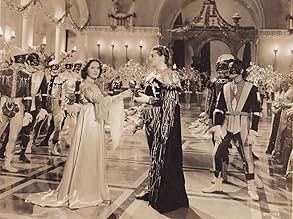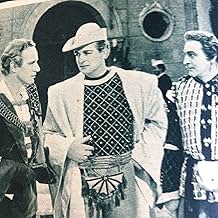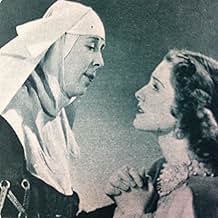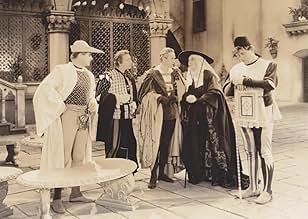IMDb RATING
6.5/10
2.4K
YOUR RATING
Young love is poisoned by a generations long feud between two noble families.Young love is poisoned by a generations long feud between two noble families.Young love is poisoned by a generations long feud between two noble families.
- Director
- Writers
- Stars
- Nominated for 4 Oscars
- 4 wins & 5 nominations total
Charles Bancroft
- Nobleman
- (uncredited)
Dean Benton
- Minor Secondary Role
- (uncredited)
Carlyle Blackwell Jr.
- Tybalt's Page
- (uncredited)
John Bryan
- Friar John
- (uncredited)
- Director
- Writers
- All cast & crew
- Production, box office & more at IMDbPro
Featured reviews
This production got glitsy treatment by production head Irving G. Thalberg, who was showcasing his wife, Norma Shearer, playing Juliet: two years of research, a crew sent to Verona to photograph parts of the city; reconstruction of Verona's Church of San Zeno on the back-lot; thousands of extras; beautiful costumes and sets, etc. Although the screenplay was shortened, Thalberg also insisted that only Shakespeare's words were to be used in the dialogue. That would be a pleasure for those who knew the play, but a bane for those who didn't. Shakespeare's spoken dialogue isn't very easy to understand. Like any foreign language you learned a little bit in school, you can translate written material and get the gist of what is going on, but try deciphering normal speech in that language and you will be lost. I had a difficult time understanding some of the speeches (almost nothing that John Barrymore was saying) - they flew by me too fast. (On the other hand, I studied Hamlet and Macbeth in school and relish watching movie versions of those plays.) Still, I enjoyed this film, since I knew the general story, and there were sections that didn't tax my knowledge of Shakespearean English. Some of the lines were beautiful. I never new that the expression "star-crossed lovers" was Shakespeare's. Edna May Oliver's comedy was superbly played and the acting of the rest of the cast was excellent. The title characters were supposed to be teenagers, so that both Leslie Howard (at 54) and Norma Shearer (at 31) were a bit old for their parts, but that was a minor point. My advice to anyone wishing to watch this film: read the play first!
The lavish treatment given to this by MGM and Irving Thalberg (his final production showcasing his wife Norma Shearer as Juliet) does work, as do the mature lovers and their supporting cast (Leslie Howard fitting the part of Romeo perfectly, John Barrymore and Basil Rathbone out-swashing each other as Mercutio and Tybalt), Edna May Oliver as the Nurse, typically loud, and Ralph Forbes as a bizarre Paris (no, I can't see why Juliet would want to marry him either, despite her parents' wishes). The music is lovely, despite being stolen from more classical stuff, the settings are perfectly in tune, the verse is spoken with some feeling and inspiration. Why this version doesn't get seen more often I don't know (not even on video in the UK).
ROMEO AND JULIET, the scions of old Verona's two most powerful families, become the playthings of fate & the fools of fortune.
This was a Very Big Film for MGM in 1936. No (reasonable) expenses spared. Not only was the Studio tackling The Bard for the first time in a major way, but the extreme celebrity of the original play guaranteed a great deal of public attention. Several choice roles were available for MGM's brightest stars and the part of Juliet would be the desire of every young actress on the lot.
Almost predictably the role went to Norma Shearer, who, as Irving Thalberg's wife, could almost pick & choose what she (or Irving) wanted. However, it should be stated at once that she is splendid in the role. Sweetly demure, innocent, apprehensive, fiercely protective of her love & recklessly heedless of her fate - she is Shakespeare's heroine.
She is matched by Leslie Howard's Romeo. A bit giddy at first with puppy love, he quickly matures into a tender lover & vengeful killer, finally willing, like Shearer, to forego all of his Catholic teaching and commit self-murder, thus dooming himself to Perdition.
Although decades too old for their roles (Juliet was 12, Miss Shearer 34; Romeo about 16, Mr. Howard was 43) they understand and speak their lines much more beautifully & proficiently than any teenager. Shakespeare's lines are really verse of a high order and demands skill & maturity. Howard & Shearer certainly have no problem there. Nor were they the only members of the cast whose ages were rather past the prime.
In his only feature length Shakespearean film, John Barrymore amply displays his celebrated talent in a bravura performance as an aging, sottish Mercutio. Barrymore understood the character thoroughly and he turns this strange, brilliant man into one of the film's chief treasures. Interestingly, much of his dialogue is rather scatological & gross, but being Shakespeare it seems to have flown under the radar of the Hays Office.
Edna May Oliver steals nearly every scene she's in as Juliet's waspish, eccentric Nurse. Basil Rathbone makes a fiery, insolent Tybalt. Reginald Denny adds a touch of distinction in the throwaway role of Benvolio, while wonderful old Sir C. Aubrey Smith & Violet Kemble Cooper are colorful as Juliet's parents.
At first blush, Andy Devine seems an odd choice for a Shakespearean production, but he is very competent as the Nurse's simpleminded servant.
Somewhat lost in this excellent cast is English actor Ralph Forbes in the rather thankless role of the County Paris. His is a somewhat sad story. Although replete with talent & charm, he still never quite reached the top echelons of stardom. He would have made a great Romeo.
Movie mavens will spot Katherine DeMille as the fair Rosaline (her cousin Agnes de Mille was the film's choreographer) and Ian Wolfe as the impoverished apothecary, both uncredited.
The film has wonderful production values - the sets, costumes and background score (borrowing themes from Tchaikovsky) all of the highest quality. For a small chuckle, watch closely during Juliet's dance at the Capulet ball - one of the dancers behind her steps on her dress hem and nearly trips. It's very fast, but worth catching.
This was a Very Big Film for MGM in 1936. No (reasonable) expenses spared. Not only was the Studio tackling The Bard for the first time in a major way, but the extreme celebrity of the original play guaranteed a great deal of public attention. Several choice roles were available for MGM's brightest stars and the part of Juliet would be the desire of every young actress on the lot.
Almost predictably the role went to Norma Shearer, who, as Irving Thalberg's wife, could almost pick & choose what she (or Irving) wanted. However, it should be stated at once that she is splendid in the role. Sweetly demure, innocent, apprehensive, fiercely protective of her love & recklessly heedless of her fate - she is Shakespeare's heroine.
She is matched by Leslie Howard's Romeo. A bit giddy at first with puppy love, he quickly matures into a tender lover & vengeful killer, finally willing, like Shearer, to forego all of his Catholic teaching and commit self-murder, thus dooming himself to Perdition.
Although decades too old for their roles (Juliet was 12, Miss Shearer 34; Romeo about 16, Mr. Howard was 43) they understand and speak their lines much more beautifully & proficiently than any teenager. Shakespeare's lines are really verse of a high order and demands skill & maturity. Howard & Shearer certainly have no problem there. Nor were they the only members of the cast whose ages were rather past the prime.
In his only feature length Shakespearean film, John Barrymore amply displays his celebrated talent in a bravura performance as an aging, sottish Mercutio. Barrymore understood the character thoroughly and he turns this strange, brilliant man into one of the film's chief treasures. Interestingly, much of his dialogue is rather scatological & gross, but being Shakespeare it seems to have flown under the radar of the Hays Office.
Edna May Oliver steals nearly every scene she's in as Juliet's waspish, eccentric Nurse. Basil Rathbone makes a fiery, insolent Tybalt. Reginald Denny adds a touch of distinction in the throwaway role of Benvolio, while wonderful old Sir C. Aubrey Smith & Violet Kemble Cooper are colorful as Juliet's parents.
At first blush, Andy Devine seems an odd choice for a Shakespearean production, but he is very competent as the Nurse's simpleminded servant.
Somewhat lost in this excellent cast is English actor Ralph Forbes in the rather thankless role of the County Paris. His is a somewhat sad story. Although replete with talent & charm, he still never quite reached the top echelons of stardom. He would have made a great Romeo.
Movie mavens will spot Katherine DeMille as the fair Rosaline (her cousin Agnes de Mille was the film's choreographer) and Ian Wolfe as the impoverished apothecary, both uncredited.
The film has wonderful production values - the sets, costumes and background score (borrowing themes from Tchaikovsky) all of the highest quality. For a small chuckle, watch closely during Juliet's dance at the Capulet ball - one of the dancers behind her steps on her dress hem and nearly trips. It's very fast, but worth catching.
While I was looking for new materials to help teach "Romeo and Juliet," I found the 1936 version of the play and naturally I was intrigued. I'm assuming that most people know the basic plot and have seen other versions of the film, if this is not the case you may want to stop reading and keep the surprise for viewing.
This version is faithful if not to the exact order of all the dialogue then to the acts and scenes written by Shakespeare. For those teachers that are looking for a version that explains how the letter from Friar Lawrence never reaches Romeo and the reaction of the local populace to "Plague," this is the version that does it very well. Not only do we learn why Friar John never gets to Romeo but we also get the death duel between Romeo and Paris, a scene that has been cut out of every other version I've seen. Plus we get the closing moment of peace between the families. However, the death of Lady Montague is omitted.
The movie leaves a little to be desired by modern audiences and the typical class of high school freshman many need some heavy prep work to get them ready to view "black and white" and "old" as something other than "lame." But, I think that segments of the film would be well worth showing to the class and viewed as a treat and not a torture when it's not the whole product being shoved down in one lump.
I recommend checking it out as an additional resource to add a balanced movie perspective to the characters Shakespeare created. The main problem with it is the age of the actors playing the parts of all these young people. Leslie Howard is 40 years old. Norma Shearer must be of a similar age and it shows in some of the scenes. The age of the people supposedly playing teenagers does strain credibility and at times the acting leaves a lot to be desired. They don't convincingly play "passion." You can chalk the overall feeling of muted emotion to the era because at times the emotions do come through brilliantly.
This version is faithful if not to the exact order of all the dialogue then to the acts and scenes written by Shakespeare. For those teachers that are looking for a version that explains how the letter from Friar Lawrence never reaches Romeo and the reaction of the local populace to "Plague," this is the version that does it very well. Not only do we learn why Friar John never gets to Romeo but we also get the death duel between Romeo and Paris, a scene that has been cut out of every other version I've seen. Plus we get the closing moment of peace between the families. However, the death of Lady Montague is omitted.
The movie leaves a little to be desired by modern audiences and the typical class of high school freshman many need some heavy prep work to get them ready to view "black and white" and "old" as something other than "lame." But, I think that segments of the film would be well worth showing to the class and viewed as a treat and not a torture when it's not the whole product being shoved down in one lump.
I recommend checking it out as an additional resource to add a balanced movie perspective to the characters Shakespeare created. The main problem with it is the age of the actors playing the parts of all these young people. Leslie Howard is 40 years old. Norma Shearer must be of a similar age and it shows in some of the scenes. The age of the people supposedly playing teenagers does strain credibility and at times the acting leaves a lot to be desired. They don't convincingly play "passion." You can chalk the overall feeling of muted emotion to the era because at times the emotions do come through brilliantly.
Unlike so many of the other commentators below, I am not a fan of Ms. Shearer. In her opening scene, she gushily keeps herself wide-eyed and smiling--all the time acting innocent, while Olivia Hussey and other screen Juliets don't have to act innocent: they are innocent.
That said, this film has much to offer, despite its lacking the passion of other more recent versions. The verse is spoken well, and Barrymore is brilliant as Mercutio. Yes, he's pure ham---but a succulent one. His Mercutio is, as the character's name implies, mercurial as well as absurdist, ironic, and virile. Rathbone is like a living rapier and gets my vote as the best Tybalt the screen has ever seen. However, don't believe producer Thalberg's ballyhoo that every word spoken in this film is from Shakespeare's play: it isn't, although it's close.
That said, this film has much to offer, despite its lacking the passion of other more recent versions. The verse is spoken well, and Barrymore is brilliant as Mercutio. Yes, he's pure ham---but a succulent one. His Mercutio is, as the character's name implies, mercurial as well as absurdist, ironic, and virile. Rathbone is like a living rapier and gets my vote as the best Tybalt the screen has ever seen. However, don't believe producer Thalberg's ballyhoo that every word spoken in this film is from Shakespeare's play: it isn't, although it's close.
Did you know
- TriviaThe film contains the only on-screen sword fight that expert swordsman Basil Rathbone won in his entire film career.
- Quotes
Juliet - Daughter to Capulet: My bounty is as boundless as the sea, My love as deep. The more I give to thee, The more I have, for both are infinite.
- ConnectionsFeatured in Maître Will (1936)
- How long is Romeo and Juliet?Powered by Alexa
Details
- Release date
- Country of origin
- Official site
- Language
- Also known as
- Romeo and Juliet
- Filming locations
- Production company
- See more company credits at IMDbPro
- Runtime
- 2h 5m(125 min)
- Color
- Aspect ratio
- 1.37 : 1
Contribute to this page
Suggest an edit or add missing content


